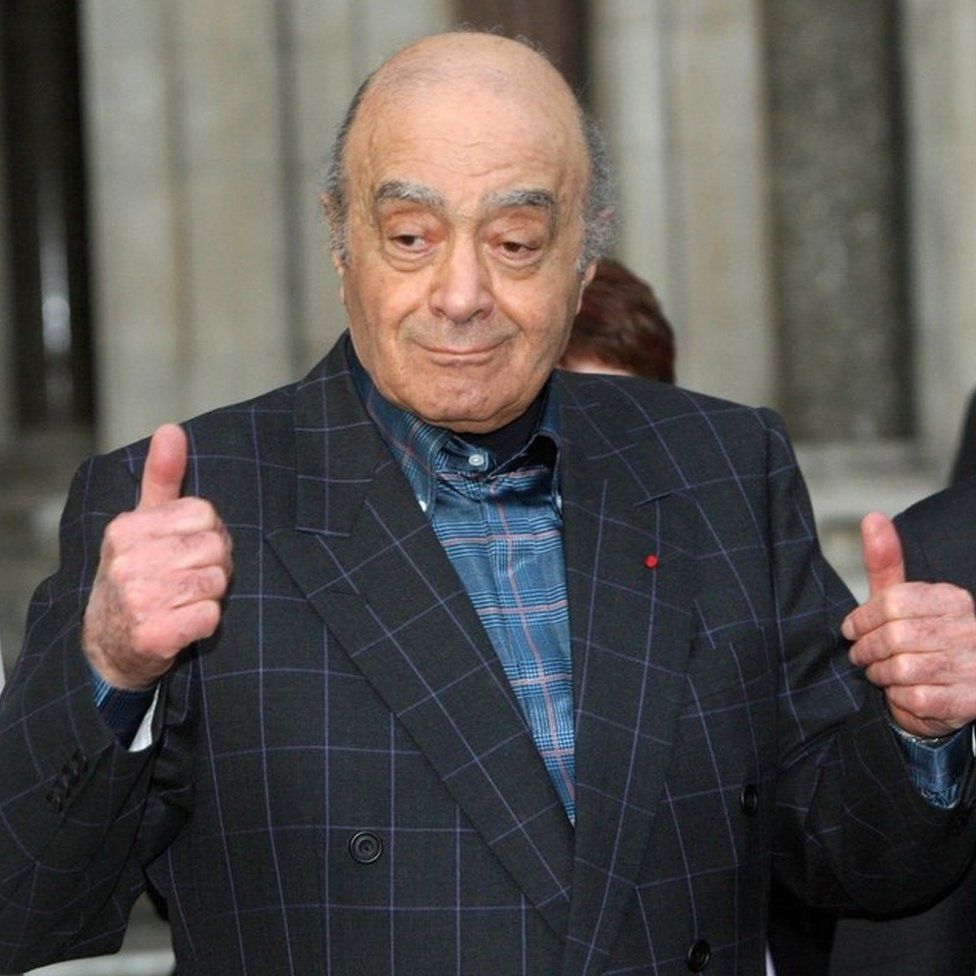Mohamed Al Fayed, who has died aged 94, rose from the streets of Alexandria to owning one of the most famous department stores in the world.
But behind the success story lay a complex man whose machinations shook the British establishment to its very core.
Allegations of impropriety brought about the downfall of three Conservative politicians.
And he continued to insist that the death of Diana, Princess of Wales, was murder – a claim dismissed by both French and British investigators and an inquest jury.
He was born plain Mohamed Fayed in Alexandria, Egypt, but his birth date has been the subject of conjecture.
In his self-approved entry in Who’s Who it is listed as January 1933 without a precise date – but when he took part in a Department of Trade inquiry it was officially recorded as 27 January 1929.
He began his business life hawking bottles of fizzy drink on the streets but gained a lucky break in the mid-1950s when he met and married the sister of the Saudi millionaire arms dealer Adnan Khashoggi.
Khashoggi gave his new brother-in-law a job which granted him access to influential circles in London and the Gulf.
By the 1960s, the Egyptian was a wealthy man who was wheeling and dealing with everyone from Arab sheiks to Papa Doc Duvalier, Haiti’s notorious dictator.
He had founded his own shipping company in Egypt and become the financial adviser to the Sultan of Brunei.
He moved to the UK in 1974 adding the “Al” to his name, a decision that saw him dubbed “the phoney pharaoh” by the satirical magazine Private Eye.
In 1979, together with his brother Ali, he bought the Ritz Hotel in Paris. Six years later, he defeated the Lonrho group in the battle to buy Harrods.
Passport denied
It sparked a feud with Lonrho’s chairman, Tiny Rowland. The Department of Trade and Industry’s report on the row, in 1990, concluded that the Fayeds had lied about their background and their wealth.
The feud with Rowland ended in 1993 with a reconciliation in Harrods food hall but it probably contributed to Al Fayed being refused British citizenship. He viewed the decision as an affront to his dignity.

“Why won’t they give me a passport?” he railed at the time. “I own Harrods and employ thousands of people in this country.”
Disappointed over the passport affair, Al Fayed told the press that he had paid two Conservative ministers, Neil Hamilton and Tim Smith, cash to ask questions related to his interests, in the House of Commons.
Both left the government. Hamilton, who strenuously denied the allegation, lost a subsequent libel case against Fayed.
Jonathan Aitken, then a Cabinet minister, resigned after Fayed revealed that he’d been staying for free at the Ritz in Paris at the same time as a group of Saudi arms dealers.
Aitken would eventually serve time in prison for lying about the affair in court and Al Fayed’s vendetta against the Conservative party inflicted lasting damage.
Tangles with the royals
Among his other business dealings were the ownership of Fulham Football Club and a 50,000-acre estate in Scotland which he developed into a tourist attraction.
For years Al Fayed had courted the Royal Family, sponsoring events like the Windsor Horse Show.
When it emerged that his son, Dodi, had become a close friend of Diana, Princess of Wales, it seemed he might be moving closer to, if not acceptance by, the British establishment.

But everything changed in 1997 when his son and the princess were killed in a car crash in Paris while being driven and guarded by Al Fayed’s employees.
Evidence that the car’s driver had been drinking heavily embarrassed Al Fayed, but he shifted the blame.
“The paparazzi are the main cause. If anyone wanted to hurt my son or Diana they had plenty of opportunities,” he said.
At the crash inquiry he verbally abused the princess’s mother, Frances Shand Kydd, saying: “I don’t give a damn about her. She is a snob.”
Frustration with the UK
In the years after the accident, Al Fayed continued to blame what he called “the establishment” for the deaths of Dodi and Diana.
In February 2008, he gave evidence at the inquest into the deaths claiming the couple had been murdered on the orders of Prince Philip and with the connivance of MI6.
His remarks were widely condemned and, in summing up, the coroner said that “the conspiracy theory advanced by Mohamed Fayed has been minutely examined and shown to be without any substance”.

In 2010, after months of denying Harrods was for sale, he sold the business to Qatar Holdings for £1.5bn. Nearly half of the purchase price was used to clear the company’s debts.
In an interview with the London Evening Standard, Al Fayed claimed he had sold Harrods because he was frustrated with pension fund trustees blocking his efforts to extract a dividend.
“I’m here every day, I can’t take my profit because I have to take a permission [sic] of those bloody idiots.”
Still bitter over the death of his son, Al Fayed bankrolled a 2011 documentary entitled Unlawful Killing, which reiterated his conspiracy theories about the Paris crash.
Although it was shown at the Cannes film festival, legal issues prevented it going on general release.
Al Fayed never forgave his adopted country for refusing the citizenship he craved so much.
The political scandals and the accusations over the deaths of Dodi and Diana, were seen by many as his revenge against an establishment which had never accepted him as one of its own.
